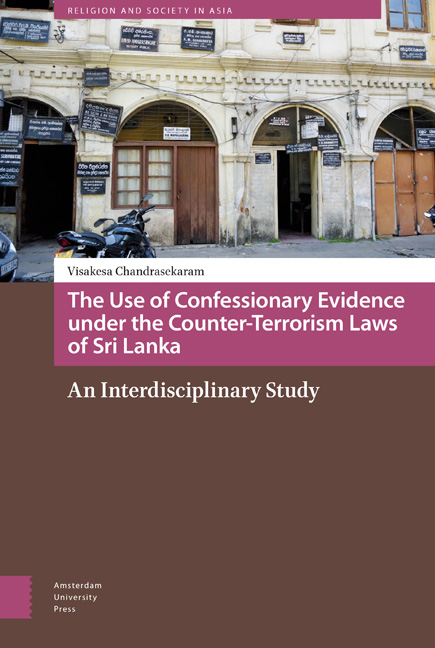 Use of Confessionary Evidence under the Counter-Terrorism Laws of Sri Lanka
Use of Confessionary Evidence under the Counter-Terrorism Laws of Sri Lanka Book contents
- Frontmatter
- Dedication
- Contents
- 1 Do Tigers Confess?
- 2 Rebellion and Martyrdom
- 3 Facts, Falsities, and Fictions
- 4 Punitive Interrogation of Tamil Tiger Suspects
- 5 Judgement of the Terrorist Against the ‘Formula of Justice’
- 6 Fantasies, Fictions, Myths, and Denials about Tamil Tigers’ Confessions
- Appendix
- Acronyms
- Acknowledgements
- About the author
- Bibliography
- Index
5 - Judgement of the Terrorist Against the ‘Formula of Justice’
Published online by Cambridge University Press: 10 December 2020
- Frontmatter
- Dedication
- Contents
- 1 Do Tigers Confess?
- 2 Rebellion and Martyrdom
- 3 Facts, Falsities, and Fictions
- 4 Punitive Interrogation of Tamil Tiger Suspects
- 5 Judgement of the Terrorist Against the ‘Formula of Justice’
- 6 Fantasies, Fictions, Myths, and Denials about Tamil Tigers’ Confessions
- Appendix
- Acronyms
- Acknowledgements
- About the author
- Bibliography
- Index
Summary
Early in this study we discussed Spivak's submission that the war against terrorism has ‘zoomed down to a lawsuit and zoomed up to face an abstraction: terrorism’. The previous three chapters have further explored this ‘abstraction’ of terrorism, by venturing beyond the domain of the law in order to grasp the competing versions of truth about confessions. Now we return to the domain of the law as it is not possible to cover this subject matter adequately without ‘zooming in’ to examine lawsuits, where the ultimate ‘legal truth’ of confessions is redefined. This chapter will link with the previous chapter through a discussion of the construction of cases against terrorists. In seeking to answer the question, ‘What are the possibilities and limits of a fair hearing for Tigers from the judiciary in Sri Lanka?’, this chapter includes an enquiry into the procedural aspects of the court case with the aim of establishing whether the terrorist suspects were given a fair trial. Further, the materials explored in this chapter allow us to revisit the notion of legal truth about confessions, by assessing the substantive and procedural elements of the counter-terrorism laws (domestic law) against the standards of international human rights law (international law). The key case study presented in this chapter is that of Nallaratnam Singarasa whose confession was assessed against the ‘semiotic criteria’ of truth in Chapter 3. The methodology used in this chapter involves presenting and analysing research materials on barriers in the criminal justice system, analysing data gathered from the field interviews and field observations, and analysing court transcripts and law reports.
The pinnacle of Sri Lanka's legal war against terrorism is enacted in the High Court where a judgement is made to determine the truth about the confessions of Tamil Tigers in order to convict or acquit them. This is the final act in this legal war, where the suspect must face the public in a theatrical enactment of bringing justice to the citizens affected by terrorism. Here the secret rituals of interrogatory punishment are brought to a close through a humiliating court trial in which terrorist suspects are herded into court alongside other criminals, tied to each other with iron chains and guarded by uniformed prison officers with machine guns.
- Type
- Chapter
- Information
- Use of Confessionary Evidence under the Counter-Terrorism Laws of Sri LankaAn Interdisciplinary Study, pp. 145 - 184Publisher: Amsterdam University PressPrint publication year: 2017


